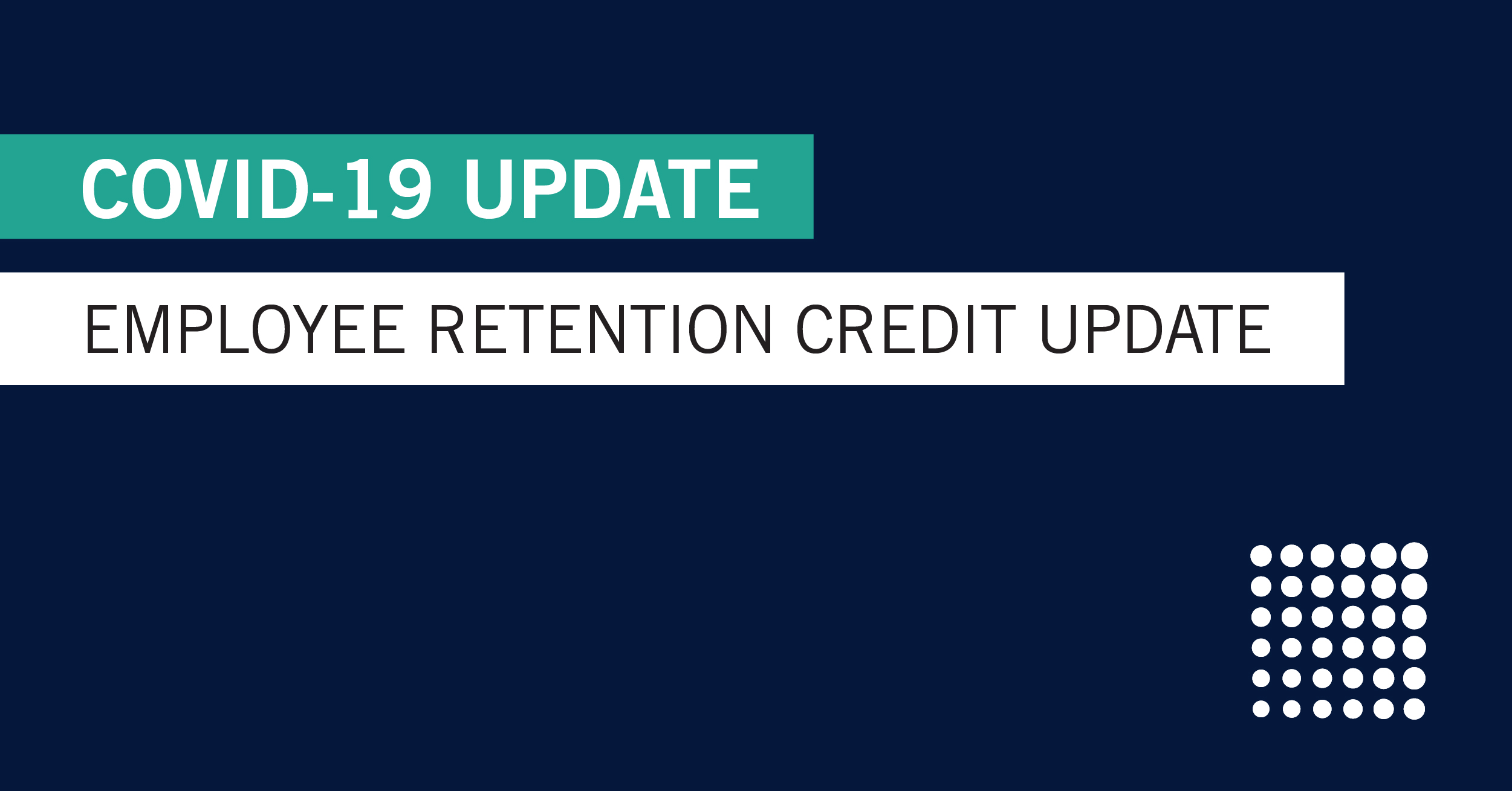Meeting the IRS qualifications for ERTC to hold up against an IRS audit
Most COVID-19 relief programs have expired, however, the Employee Retention Tax Credit (ERTC) has recently stepped back into view.
Dental practice owners have been contacted by specialty tax consultants and retrieval companies offering to help them claim ERTC retroactive credits. These new companies are advertising credits often in the hundreds of thousands of dollars, so it’s hard for an offer like this to not spark curiosity.
But will it hold up against an IRS audit?
Similar to the advice given on the Research and Development Tax Credit, our CPAs and tax law professionals outline the IRS qualifications that must be met and CWA’s opinion on if our clients should attempt to claim this credit.
ERTC ELIGIBILITY REQUIREMENTS:
The eligibility rules governing the ERTC have undergone several revisions since it was first introduced in March 2020 and updated in June of 2021. This summary should level-set the key expectations and requirements.
As a reminder, there are scenarios under which a business can file for the ERTC:
- A decline in gross receipts with a drop by 50% or more for any quarter in 2020 when compared to the same quarter in 2019, and/or a drop by more than 20% for any quarter in 2021 compared to same quarter in 2019.
- A government order requiring a full or partial shutdown. This is based on closing your physical space.
- A government order caused more than a nominal effect on your business. This is based on the modification of a business activity.
AMOUNT OF THE CREDIT
- 2020: 50% of wages per employee with a maximum of $10,000 annually. $5,000 maximum credit per employee. Quarters two, three and four are eligible.
- 2021:70% of wages per employee with a maximum of $10,000 per quarter. $21,000 maximum credit per employee. Quarters one, two and three are eligible.
Most CWA clients have already filed and received the ERTC refund if their state dental society required a mandatory shutdown or if they met the gross receipts test in 2020 or 2021.
However, there are now aggressive ERTC groups claiming dental practices can qualify for all quarters in which the ERTC is eligible. With claims in 2021 up to $21,000 per employee, it can be tempting. It is important for CWA clients to understand the exact qualifications before making any decision to submit further ERTC filings.
CAN YOUR BUSINESS JUSTIFY THIS CREDIT?
The decline in gross receipts test is the best way to qualify and easy to calculate. This blog will not focus on this test, since most dental professionals do not qualify. Full shutdown of dental practices, if mandated by the state dental society, typically lasted between eight to 15 weeks beginning in March 2020, allowing most dental practices to qualify during their mandated shutdown in 2020.
The only qualification method still up for debate for dental practices is a government order requiring either a partial shutdown or a modification to a business activity that caused more than a nominal effect. Thanks to the IRS safe harbor, a nominal portion or effect is defined as 10%. So, if a government order caused:
- A nominal portion of your operations to be suspended, and you had a reduction of more than 10% in gross receipts or worker hours as compared to the same quarter in 2019, you would qualify. This qualification is explicitly regarding a change to your physical space. For example, a restaurant had to shut down the indoor sit-down service.
CWA Comments: Outside of the initial required shutdowns, we do not know of any government order that required dental practices to partially shut down a portion of their physical space. When dental practices reopened, they fully utilized all revenue generating space. Your waiting room does not qualify.
- A required nominal effect safe harbor modification that impacted your business activity by 10% or more. This qualification is based solely on a modification of business activity. For example, keeping people six feet apart. A restaurant was able to reopen but had to reduce capacity from 50 to 30 people to keep tables six feet apart.
CWA Comments: Dental practices had to modify their waiting rooms and entry to their offices and provide increased cleaning procedures. However, these alone do not qualify you for the ERTC. You must also meet the nominal effect test of being able to see patients.
For example, you would qualify if you reduced the number of hygiene chairs to meet the six feet test, and this resulted in 10% fewer patient visits in the same quarter in 2021 as compared to 2019. Most CWA practices were operating at full capacity and did not see a nominal reduction in the number of patients. In our opinion, you must look at your full business activity (hygiene) and not one specific hygienist.
WHAT DOESN’T QUALIFY
- Disruptions in commerce or supply chain such as PPE
- Purchase of increased air filtration and other cleaning and sanitation enhancements
- Material costs increased due to federal, state, or local restrictions
- Staffing shortages or difficulty bringing staff back to work
- Reduced business hours
- Unable to travel or attend meetings
All of the above are items that CWA has seen aggressive ERTC companies use to qualify. While it is possible they may help you qualify, you must still meet the nominal portion or nominal effect test above based on the IRS 10% safe harbor. These items alone do not meet qualification.
ADDITIONAL REQUIREMENTS & ENFORCEMENTS
It is extremely important to note that the same wages cannot be used for both the ERTC and PPP forgiveness. If you have filed for extra ERTC filings and the group did not compare this to the wages you used for PPP forgiveness in 2020 and 2021, then you likely are not in compliance. This is a complicated calculation and ERTC groups that simply amend all your payroll tax returns have not properly prepared your amened payroll tax returns for the ERTC.
If audited and found not in compliance, or you filed and falsely qualified, you will be responsible for paying back the credit plus penalties and interest. Additionally, the IRS could decide to pursue criminal charges if it believes a claim was deliberately fraudulent.
It remains to be seen if these aggressive ERTC groups will be able to defend any of their positions. Many are small companies with very few employees. Can they really defend you in an audit? Will they even be around in three years if you are audited? If the IRS finds success against multiple clients with a specific ERTC group, they could begin auditing multiple clients of the group.
KNOW WHAT YOU ARE COMMITTING TO
In addition to high fees, averaging anywhere between 15-35% of the refund, most retrieval companies have engagement contracts that remove any liability from the agency in case of audit, leaving the responsibility to fall back to the owner’s lap.
The timeline to receive these credits from the IRS can extend over nine months. Additionally, the business will lose the tax deduction for staff salaries in the amount of the credit, creating taxable income in the amount of the credit. This effectively makes the credit taxable, requiring taxes owed when the corporate return is amended. Although this doesn’t seem like a huge issue, consider the impact on your cashflow:
Example Calculation for ABC Dental Practice:
- Practice has eight employees at $25K per month in staff salaries in 2021
- This equates to a $168K credit (number of employees x $7K)
- Subtract an average retrieval company 25% fee ($168K x 25% = $42K)
- Subtract taxes owed on additional income ($168K x 40% = $67.2K)
- Subtract fees associated with amending payroll and income tax returns ($5K)
Net Benefit to Doctor = $53.8K ($168K – $42K – $67.2K – $5K). The net benefit is much less than retrieval companies are promising.
CWA’S THOUGHTS
The ERTC was designed to aid struggling businesses during the COVID-19 pandemic to supplement businesses who made the decision to retain employees on the payroll when the business itself was financially instable.
The qualifying period was extended to support those businesses who were still struggling in 2021. If your business rebounded, was not partially shut down, did not see a drop in patient visits or did better in 2021, it will be extremely hard to justify qualifying for a tax credit.
ERTC statutes were pushed out in a hurry by Congress. The language for qualifications is vague and current guidance only exists in the form of FAQs, leaving what can be perceived as room for interpretation.
Some ERTC groups have reportedly urged businesses to file questionable ERTC claims, arguing that the IRS routinely approves them with minimal scrutiny. Keep in mind, that although there is no clear guidance now, the IRS can still create it after the fact.
If you feel any of the above qualifications exist for your practice, please reach out to discuss with your planner. CWA wants every client that qualifies for the ERTC to claim the credit and help their practice.














